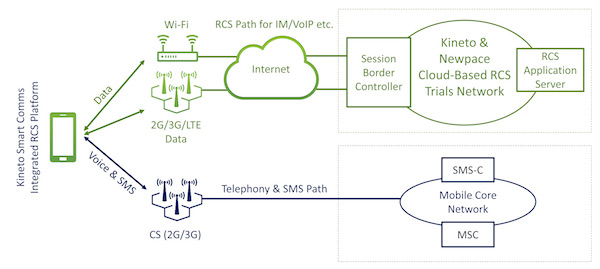Kineto Wireless is offering mobile operators the opportunity to try out its customisable Rich Communication Services (RCS) Smart Comms application for free, in a bid to prove how its solution is a much more attractive option than joyn.
Smart Comms is a customisable plug-and-play application targeted at Tier-1 operators and MVNOs that works as soon as the user downloads it from the relevant smartphone app store (Android and iOS are currently supported), bringing traditional circuit-switched telephony services together with new VoIP-based services in one app.
Supported by an RCS network in the cloud, users can choose to make regular voice calls or VoIP calls straight from the app, as well as send messages, which are received as either IM chat messages or SMS texts, depending on whether the recipient has a data connection on their device at the time the message is sent.
Users can send images and even hold a group video chat or messaging chat from within the app, which offers a full handover in and out of Wi-Fi.
According to Kineto, the group chat function can currently support up to 2,000 users on the trial network they set up with NewPace, which could offer operators an interesting opportunity if they are seeking to offer Unified Communications as a Service (UCaaS) offerings to enterprises.
“There’s nothing wrong with joyn – it’s good for cohesion in that it’s based on the RCS-e standards, but it’s fairly prescriptive,” Kineto’s vice president of technology Keith Mumford told Mobile Europe.
“Operators are still unsure of RCS-e and for operators who are looking for differentiation, joyn is just another type of ‘me too!’ What we’re trying to do is combine RCS and joyn, while giving operators the ability to do-it-yourself.”
Kineto began tracking the rise of OTT apps and IMS deployments 20 months ago, realising that RCS-e services are vital to compete in “the IP world”, particularly since there are less client vendors in this space, Mumford explains.
“We wanted to take what we’ve done on SMS with fixed telephony, Android and iOS and do that with RCS, integrating all the elements into one app to offer operators a more intuitive front end,” he said.
“Operators are increasingly feeling disintermediated from mobile operating systems today as the operator’s brands are no longer in the face of the customer. [Smart Comms] creates a platform for operators to compete against OTT app providers while bringing their brand back in front of consumers.”

How Kineto’s RCS platform works
What about the OTT threat?
“Some operators, particularly in France and Germany, are more able to recognise the importance of RCS-e and have tried to compete with OTT apps, such as Telefónica with TU Go, while others have started to work with them,” stresses Mumford.
“That has been successful to a certain degree, but there is no incentive for OTT apps to offer SMS and voice services.
“Operators control the network and [Smart Comms] enables them to work with third parties and put in features that their rivals might not have, such as a visual voicemail [menu] feature providing a visual menu of recordings.”
Kineto sees the future of RCS-e being in tablets and is currently working to add more features to Smart Comms, such as location-sharing and “social snapshot”, whereby a user can see a summary of what a contact has been posting on social media channels before getting in touch with them.
Read More:



